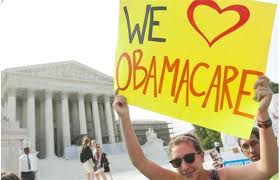Personally, I'm kind of tired of these "Repeal Obama Health Care" commercials sponsored by Americans for Prosperity, the conservative organization founded by billionaire businessman and conservative/libertarian political activist David Koch (and the Koch brothers) and who are a major force behind the Tea Party movement. Such organizations are running millions of dollars of ads against Democratic candidates all across the country to steer more than $200 million (potentially much more) to conservative groups ahead of Election Day, in order to promote deregulation, less government spending, increased oil drilling, opposition to the health care law, and efforts to defeat cap-and-trade legislation. BLAH! For many people without health insurance, a key question raised by the Supreme Court's decision to uphold the Affordable Care Act is whether states will decline to participate in the law's big Medicaid expansion. Some people argue this is the best way to go. I say NO. Health is a civil right, like marriage and voter equality. It is a federal right and should have ALWAYS been a part of our national constitution! (Next up on my list is housing for everyone. Yeah I said it, and I'm not talking about those rickety piss stained gunshot riddled places we call housing projects). Anyway, although the court upheld the law's mandate requiring individuals to buy insurance, the justices said the act could not force states to expand Medicaid to millions by threatening to withhold federal funding. Republican leaders of some states already are saying they are inclined to say thanks, but no thanks. (Surprised????? I'm not!) Let's put it this way...we've been through this before. We went through it with the emancipation of slavery. We went through it with manumission. We went through it with civil rights and voter rights. I can just see the mass exodus of the poor from states that refuse to give them health coverage (which is kind of what those states want anyway. Shout out to Texas and Virginia and Montana. The list goes on). More than 46.2 million Americans live in poverty — the highest number in the 52 years for which such estimates have been published, according to census figures released Tuesday. From 2009 to 2010, the nation's poor increased by 2.6 million, and the number of those without health insurance grew by nearly 1 million people.In Florida, 3.8 million people — more than one in five — were without health insurance last year. Nationwide, the number of uninsured was closer to one in six. Of those Americans not working, 28.5 percent were without health-care coverage — the same percentage as part-time workers. But even among those who worked full time, 15 percent were without insurance, the continuation of a trend that began a decade ago with rising insurance rates.Since 2001, the number of Americans with employer-provided insurance has declined from 179.9 million to 169.2 million. In some cases, employers stopped offering such coverage. But there are also employees who decided they could no longer afford the premiums.There are patients whose employers have dropped health-care insurance because the costs are too high."The recession and high unemployment also took a bite out of family income. Median family income in the United States dropped 2.3 percent from 2009 to $49,445. Since the recession began in 2007, median household income has declined by 6.4 percent.How many more have to fall into poverty before we say enough? Our nation's policymakers should acknowledge that increasing poverty is a national crisis instead of allowing it to be a moment in the 24-hour news cycle. And our lawmakers should address it with the same level of urgency, time and resources that they devoted to the extended debate over the debt ceiling. The issues are a focal point in the discussion of President Barack Obama's proposed jobs package and haggling over the safety net of Medicare and Medicaid. What these numbers tell us is that one in five Floridians still lack health insurance — and that's a real problem. We can't afford cuts to Medicaid and Medicare, the programs that provide health care to people when they need it most. A lot of people are only one job loss away.When it all comes down to it, there may be a lot of holes in the health bill, and it may not cover every illness imaginable, but if we begin with states extending Medicaid coverage to non-elderly individuals with incomes up to 133 percent of the poverty line, or about $30,700 for a family of four, according to a March 2012 report 16 million people will be covered by 2019, so I say THANK YOU AND ALL PRAISE BE TO THE MOST HIGH and let's stop questioning whether or not we should give the gift of health and start talking about how to make healthcare an even better gift.
Monday, July 2, 2012
Subscribe to:
Posts (Atom)


